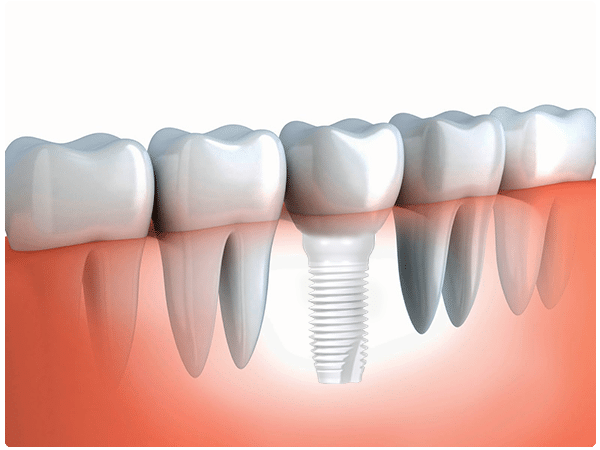A lot of factors have to be considered when looking for ways to replace a tooth or teeth. More and more people are now asking questions about the makeup for dental implants. This is mainly due to an increased interest in holistic medicine and the desire to put anything synthetic in the body. Dental implants are a huge step forward towards improving oral health, therefore, it is highly important to have a clear understanding of what to put in the body. This article focuses on comparing the two most common types of implants: zirconia vs metal. It will help to determine which one is going to be the right option for you.
Zirconia dental implants
In simple terms, dental implants are tooth root replacements, which are capped with a ceramic dental crown. An abutment is used to connect the crown to the implant. Zirconia implants are considered new to the implant market. Zirconia implants have been used in America since 2007 and in Europe since the late 1980s. However, titanium implants have been used in America since the 1960s. Both types of implants offer high acceptance rates with the body promoting Osseointegrations meaning that the bone is able to grow around the implant material just as it does around the natural tooth roots. It should be also said that they are biocompatible.
Nowadays, the majority of FDAs have improved ZIrconia implants are one piece, meaning that the artificial tooth root and the abutment are connected whereas they are two pieces with titanium dental implants. It gives a dentist a higher degree of control over a few elements of the entire implant process.
Do zirconia implants contain metal?
Zirconia implants are known for their likeness to diamonds, which is a crystal material that modified slightly when is utilized in implant dentistry to give it a tooth color. Zirconia is considered a crystal form of the transitional metal Zirconium and this type of implants is typically marked as metal-free. A ceramic Zirconium Oxide when the zirconium is treated, stabilized and converted into its crystal phase. There are a lot of people who want to keep the metal out of their mouths completely. This is mainly due to the rising concerns over the Mercury usage in dental fillings.
Titanium dental implants
People have been using titanium in the medical industry for decades. It is also commonly utilized for knee and hip replacements in addition to dentistry. It is a metal, which is strong, non-toxic, lightweight and resistant to corrosion. Dental implants made of titanium are believed to have a long-term success rate of about 95 percent. There are patients who have had their titanium implants in great condition for more than 30 years.
Allergy to dental implants
There are very few cases when people are allergic to titanium dental implants. In addition to that, there are no documented cases of patients being allergic to Zirconia. Titanium dental implants are typically produced from Titanium Alloy. It is a combination of a few metals that include small amounts of Nickle, Vanadium, and Aluminum. Only a few people who have an allergy to titanium implants are normally allergic to the small amount of Nickle, which is found in Titanium Alloy. Specialists advise making use of the MELISA test for people with a history of metal allergies.
Safety concerns of implanting zirconia and titanium into the jawbone
As was mentioned previously both zirconia and titanium are biocompatible, FDA approved and considered safe meaning that they can easily interact with the human body and are not toxic. It should be also mentioned that small amounts of titanium alloy can become present in the bloodstream but it is not going to cause adverse reactions. Just as titanium, zirconia is biocompatible as well and it does not become present in the bloodstream. In addition to that, it is hypoallergenic.
The risk of gum infection increases significantly if getting implants regardless of the material. There are also proponents of the idea that two-piece implants have a higher chance of harboring bacteria. However, single piece implants also require dental cement, which can collect bacteria. Taking this into consideration, neither option is safe from developing plaque.
Which option is better: Zirconia vs Metal?
As can be seen from all the aforementioned, each type has its advantages and disadvantages and the decision is normally taken after getting to know a patient’s goals and concerns. However, you still need to consider the aspects listed below.
- Cost: without any doubt the cost of manufacturing zirconia us much higher compared to titanium, therefore leading to higher cost. The cost of titanium implants typically ranges between $300 and $500 and the cost of a zirconia implant varies between $500 and $600. You should also have it clear that this is not a final cost because it does not include expenses associated with consultation, imagining, mapping, surgery, materials, and after-care that could account for $3000 to $6000 in total per implant.
- Ease of applying: it has been quite some time since titanium implants have been the standard in care for tooth replacement and more and more people are getting committed to this option instead of dental dentures for multiple tooth replacements. They have become very common and are considered easy for dentists to insert without any complications (unless insufficient bone density and health). On the other side, the surgical placement of zirconia has proven to be more challenging. The vast majority of zirconia implants are single pieces, thus cannot be placed completely under the gums. They are also difficult to be placed at an angle. It is highly important to be able to place the implant at a slight angle because due to teeth profile and bone density an implant’s optimal position is slightly off-centered. It should be also said that there are two-piece models that are easier to place but they have not been widely tested.
- Aesthetics: titanium produces great results for the majority of patients. Although, there are still people who are highly concerned about developing a visible grey line under the gums or along the tooth ridge. In case if the patient has a thin bone or gum tissue, the abutment of the dental implant can be produced from ceramic. In this case, no grey metal will show through. When it comes to zirconia, it is known for its aesthetics. It has a white tooth color, which looks extremely natural and does not show through gum tissue.
- Strength: titanium implants are known for being extremely strong and having high flexural properties and fracture resistance. On the other side, Zirconia has a lower level of elasticity, which potentially leads to microfractures. But they are also considered very strong and hard.
The availability of so much information regarding both titanium and zirconia dental implants makes it extremely difficult for patients to decide on the ones they prefer. The majority of dentists suggest using titanium dental implants as they have been serving the dental and medical industry for many years and have already proven how reliable they are.
When it comes to zirconia dental implants, their long-term success is yet to be proven. It is advised contacting your dentist first in order to determine whether you are the right candidate for dental implants and what are the available options for you.

